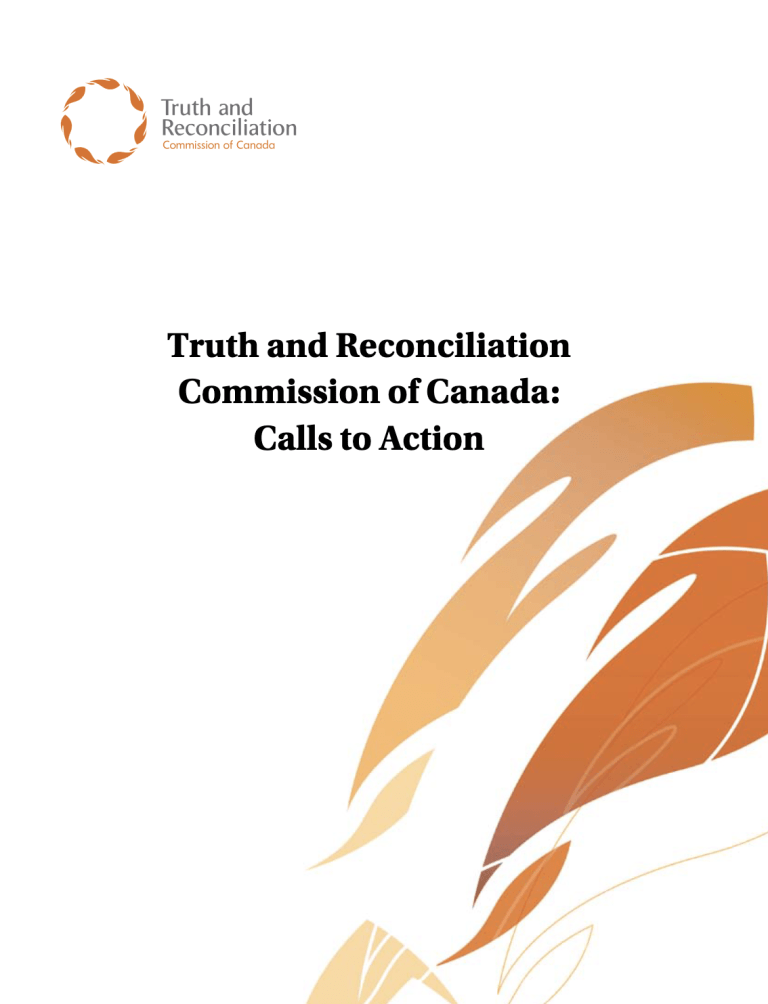30 search results
for
First Nations governments
Reconciliation
Museums and archives
Recommendation 70: We call upon the federal government to provide funding to the Canadian Association of Archivists to undertake, in collaboration with Aboriginal peoples, a national review of archival policies and best practices to:- Determine the level of compliance with the United Nations Declaration on the Rights of Indigenous Peoples and the United Nations Joinet-Orentlicher Principles, as related to Aboriginal peoples’ inalienable right to know the truth about what happened and why, with regard to human rights violations committed against them in the residential schools.
- Produce a report with recommendations for full implementation of these international mechanisms as a reconciliation framework for Canadian archives.
-
Category and theme:
Groups affected:
Reconciliation
Missing children and burial information
Recommendation 73: We call upon the federal government to work with churches, Aboriginal communities, and former residential school students to establish and maintain an online registry of residential school cemeteries, including, where possible, plot maps showing the location of deceased residential school children.-
Category and theme:
Groups affected:
Reconciliation
Missing children and burial information
Recommendation 74: We call upon the federal government to work with the churches and Aboriginal community leaders to inform the families of children who died at residential schools of the child’s burial location, and to respond to families’ wishes for appropriate commemoration ceremonies and markers, and reburial in home communities where requested.-
Category and theme:
Groups affected:
Reconciliation
Missing children and burial information
Recommendation 75: We call upon the federal government to work with provincial, territorial, and municipal governments, churches, Aboriginal communities, former residential school students, and current landowners to develop and implement strategies and procedures for the ongoing identification, documentation, maintenance, commemoration, and protection of residential school cemeteries or other sites at which residential school children were buried. This is to include the provision of We call upon the federal government to work with provincial, territorial, and municipal governments, churches, Aboriginal communities, former residential school students, and current landowners to develop and implement strategies and procedures for the ongoing identification, documentation, maintenance, commemoration, and protection of residential school cemeteries or other sites at which residential school children were buried. This is to include the provision of appropriate memorial ceremonies and commemorative markers to honour the deceased children.-
Category and theme:
Audience:
Groups affected:
Reconciliation
Missing children and burial information
Recommendation 76: We call upon the parties engaged in the work of documenting, maintaining, commemorating, and protecting residential school cemeteries to adopt strategies in accordance with the following principles:- The Aboriginal community most affected shall lead the development of such strategies.
- Information shall be sought from residential school Survivors and other Knowledge Keepers in the development of such strategies.
- Aboriginal protocols shall be respected before any potentially invasive technical inspection and investigation of a cemetery site.
-
Category and theme:
Groups affected:
Reconciliation
Commemoration
Recommendation 79: We call upon the federal government, in collaboration with Survivors, Aboriginal organizations, and the arts community, to develop a reconciliation framework for Canadian heritage and commemoration. This would include, but not be limited to:- Amending the Historic Sites and Monuments Act to include First Nations, Inuit, and Métis representation on the Historic Sites and Monuments Board of Canada and its Secretariat.
- Revising the policies, criteria, and practices of the National Program of Historical Commemoration to integrate Indigenous history, heritage values, and memory practices into Canada’s national heritage and history.
- Developing and implementing a national heritage plan and strategy for commemorating residential school sites, the history and legacy of residential schools, and the contributions of Aboriginal peoples to Canada’s history.
-
Category and theme:
Groups affected:
Reconciliation
Sports and reconciliation
Recommendation 87: We call upon all levels of government, in collaboration with Aboriginal peoples, sports halls of fame, and other relevant organizations, to provide public education that tells the national story of Aboriginal athletes in history.-
Category and theme:
Audience:
Groups affected:
Reconciliation
Sports and reconciliation
Recommendation 88: We call upon all levels of government to take action to ensure long-term Aboriginal athlete development and growth, and continued support for the North American Indigenous Games, including funding to host the games and for provincial and territorial team preparation and travel.-
Category and theme:
Audience:
Groups affected:
Reconciliation
Sports and reconciliation
Recommendation 90: We call upon the federal government to ensure that national sports policies, programs, and initiatives are inclusive of Aboriginal peoples, including, but not limited to, establishing:- In collaboration with provincial and territorial governments, stable funding for, and access to, community sports programs that reflect the diverse cultures and traditional sporting activities of Aboriginal peoples.
- An elite athlete development program for Aboriginal athletes.
- Programs for coaches, trainers, and sports officials that are culturally relevant for Aboriginal peoples.
- Anti-racism awareness and training programs.
-
Category and theme:
Audience:
Groups affected:
Reconciliation
Sports and reconciliation
Recommendation 91: We call upon the officials and host countries of international sporting events such as the Olympics, Pan Am, and Commonwealth games to ensure that Indigenous peoples’ territorial protocols are respected, and local Indigenous communities are engaged in all aspects of planning and participating in such events.-
Category and theme:
Audience:
Groups affected:
